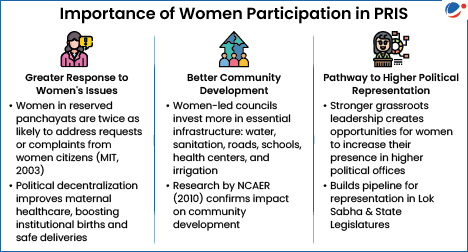Report of the committee is titled as“Transforming Women’s Representation and Roles in Panchayati Raj Systems and Institutions: Eliminating Efforts for Proxy Participation”.

- In Mundona Rural Development Foundation vs UoI (2023) Supreme Court directed forming committee to examine proxy participation in Panchayati Raj Institutions (PRIs).
Women’s Reservation in PRIs
- Constitutional Mandated: 73rd Constitutional Amendment Act (1992) established a three-tiered panchayat system and also mandated 1/3rd reservation of seats for women in PRIs.
- This quota was further expanded to nearly 50% by 21 States (Bihar was the first such states).
- Current Representation: 46.6% of elected panchayat representatives are women.
- Issue of Proxy Representation: Many elected women serve as mere figureheads, with male relatives (like sarpanch pati) taking control.
- Such practices give the impression that ‘women are not effective leaders’, defeating the purpose of reservation.
Key Reforms Proposed by the Committee
- Strict Penalties: Punishment for proven cases of male interference, though specifics remain undefined.
- Stronger Policies: Kerala-style gender-exclusive quotas, public swearing-in ceremonies, and women panchayat federations.
- Technological solutions: Virtual reality simulation training, integrating AI-powered query-driven replies to provide real-time legal guidance to WERs (Women Elected Representatives) in vernacular languages etc.
- Accountability Mechanisms: Helplines, watchdog committees, and whistleblower rewards for reporting proxy leadership.
- Use of Panchayat Nirnay Portal to allow citizens to track elected pradhans’ participation in meetings and decisions.




